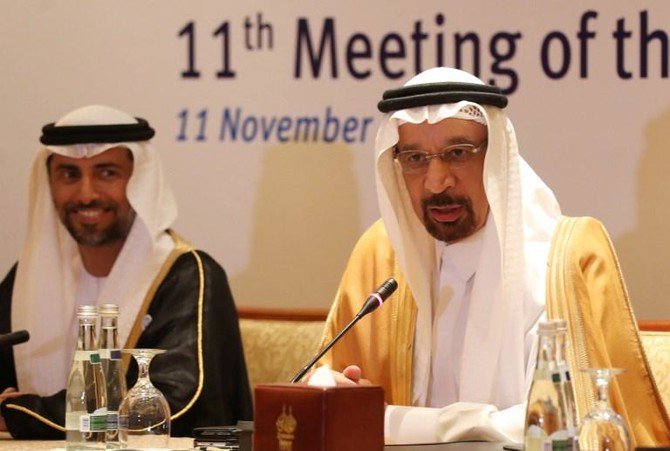
Saudi Arabia signals need for 1 million bpd cut in oil output
Saudi Energy Minister Khalid Al-Falih said on Monday OPEC and its allies agree that technical analysis shows a need to cut oil supply next year by around 1 million barrels per day (bpd) from October levels to balance the market.
Speaking at an industry event in Abu Dhabi, he said demand from Saudi Arabia’s customers in December would fall by more than half a million bpd compared with November and there was a consensus not to allow oil inventory to build up.
Oil prices rose more than 1 percent on Monday, set for their largest one-day increase in a month after the Saudi comments.
“If all things remain equal, and they almost certainly will not as things will change — it is a dynamic market — then the technical analysis we saw yesterday .... tells us that there will need to be a reduction of supply from October levels approaching a million barrels,” Falih said.
“The consensus is that we need to do whatever it takes to balance the market. If that means trimming supplies by a million (bpd), we will.”
The UAE energy minister Suhail Al-Mazrouei, currently the president of OPEC, similarly said “changes” would likely be necessary as OPEC meets in December in Vienna. However, he added: “We need not to overreact when these things happen.”
Meanwhile, Sultan Ahmed Al-Jaber, the head of the state-run Abu Dhabi National Oil Co., said the UAE planned to increase oil production to 4 million barrels of oil a day by 2020 and 5 million barrels a day by 2030. The UAE now produces some 3 million barrels of oil a day.
Al-Jaber also said the UAE would begin fracking — injecting high-pressure mixtures of water, sand or gravel and chemicals — to gain access to otherwise unreachable natural gas reserves.
“Make no mistake: Hydrocarbons will continue to play an absolutely essential part of a diversified energy mix,” Al-Jaber said.
US sanctions against Iran had removed less oil than expected from the market, Falih said. Washington has granted exemptions to Iran’s biggest buyers.
“Sanctions didn’t cut so much out of the market as anticipated,” Falih said.
Saudi-led OPEC and its allies including Russia decided in June to relax output curbs in place since 2017, after pressure from US President Donald Trump to reduce oil prices and make up for supply losses from Iran.
Oil prices have since come under downward pressure from rising supplies, despite the new US sanctions on Iran. Forecasts of a 2019 supply surplus and slowing demand have also dented the market.
Falih said Saudi Arabia was not preparing for a breakup of the Organization of the Petroleum Exporting Countries and believed the group would long remain the global central bank for oil.
Saudi Arabia’s top government-funded think-tank has been studying the possible effects on oil markets of a breakup of OPEC, the Wall Street Journal reported on Thursday, citing people familiar with the matter.
Falih said the think-tank was just trying “to think outside the box” and analyze all scenarios.
“OPEC is essential for the stability of oil markets,” he said.
On Sunday, Falih had announced plans by Saudi Arabia to reduce oil supply to world markets by 500,000 bpd in December as the country faces uncertain prospects in getting other producers to agree to a coordinated output cut.
Falih told reporters that state oil company Saudi Aramco’s customer nominations would fall by 500,000 bpd in December versus November due to seasonal lower demand. The cut represents a reduction in global oil supply of about 0.5 percent.


























